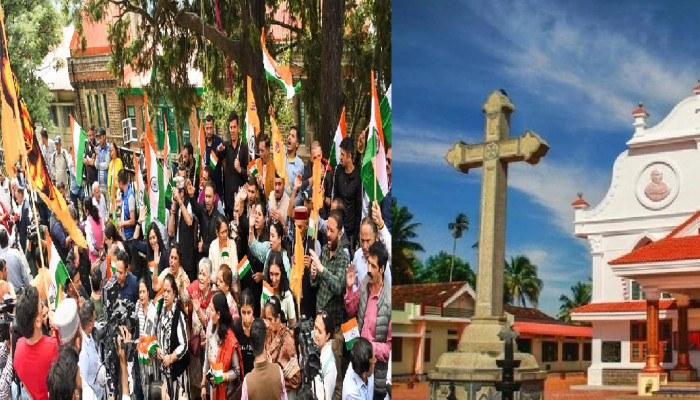Protests intensify in Kerala's Munambam as Waqf Board claims land belonging to 600 Christian families
- In Reports
- 04:27 PM, Nov 11, 2024
- Myind Staff
Mass protests have erupted in Munambam, Ernakulam, as over 600 families, predominantly Christian, contest a claim by the Waqf Board on 404 acres of land. The Syro-Malabar Church and other Christian organisations have rallied to support the affected residents, sparking widespread demonstrations and solidarity events across the state.
On Sunday, the Syro-Malabar Church organised solidarity events in nearly 1,000 churches across Kerala, with the All-Kerala Catholic Congress, the official representative body of the Church, reportedly leading the charge. Special prayers were held following Sunday Mass in churches to support the residents of Cherai and Munambam who claim ownership over the disputed lands, backed by registered property deeds and land tax receipts.
Major Archbishop Raphael Thattil, head of the Syro-Malabar Church, called on both state and central governments to intervene in the dispute. “This is a humanitarian issue and must be addressed in a humane, democratic way, in accordance with the Constitution,” Archbishop Thattil said, following his visit to a hunger strike in Munambam on Saturday.
Archbishop Dr. Joseph Kalathiparambil of the Varapuzha Latin Archdiocese echoed these concerns, urging authorities to adopt a moral stance. He affirmed that Munambam land does not belong to the Waqf Board, citing past discussions between Varapuzha Archdiocese officials and government representatives.
Tensions around this issue have intensified among Kerala’s Christian population, especially following opposition from the state’s CPI(M)-led Left Democratic Front (LDF) and Congress-led United Democratic Front (UDF) to the BJP-led central government’s Waqf (Amendment) Bill, 2024. Many believe that provisions in the Waqf Act have allowed the Waqf Board to claim properties owned by Christian families in the area.
V. Abdurahiman, Kerala’s Minister for Waqf and Haj Pilgrimage reassured the public on Sunday that the government would not initiate evictions in Munambam. “The government will resolve the issue and has no plans to evict anyone,” he stated, urging that the situation should not be viewed as a communal matter. However, the Munambam Bhoo Samrakshana Samiti, a local organisation, warned that protests would continue if the issue remains unresolved.
The dispute has also brought political tension to the fore. The UDF and LDF recently passed a unanimous resolution in the state assembly opposing the Waqf (Amendment) Bill, which seeks to limit the expansive powers of the Waqf Board. Deepika, a publication associated with the Syro-Malabar Church, criticised the UDF and LDF in an editorial, accusing them of upholding Waqf laws that impact Christian families without considering their concerns.
In September, the Syro-Malabar Church, alongside the Kerala Catholic Bishops Council, submitted a letter to the Joint Parliamentary Committee (JPC), calling attention to the Waqf Board’s alleged encroachment on Christian-owned land. Archbishop Andrews Thazath, chairman of the Syro-Malabar Public Affairs Commission, noted in the letter that the Waqf Board’s actions have endangered the livelihoods of around 600 families from the fishing community. “These people belong to the impoverished fishermen community,” he wrote, mentioning that a local Catholic Parish Church, convent, and dispensary are also threatened with eviction.
Cardinal Baselios Cleemis, President of the Kerala Catholic Bishops Council, expressed similar concerns in a letter to the JPC. He highlighted the plight of over 600 families at Munambam Beach who have endured hardships under the Waqf Law since 2002, calling for a resolution to prevent further suffering among affected residents.
The Waqf Board's claim and the Church-led protests reflect deep-seated tensions, with both state and religious leaders pressing for swift governmental intervention to prevent further escalation and protect community interests.







Comments